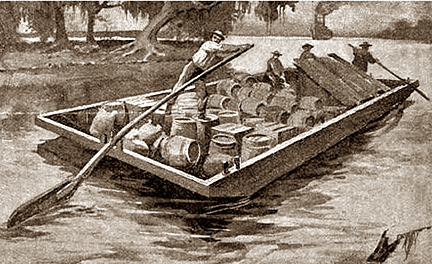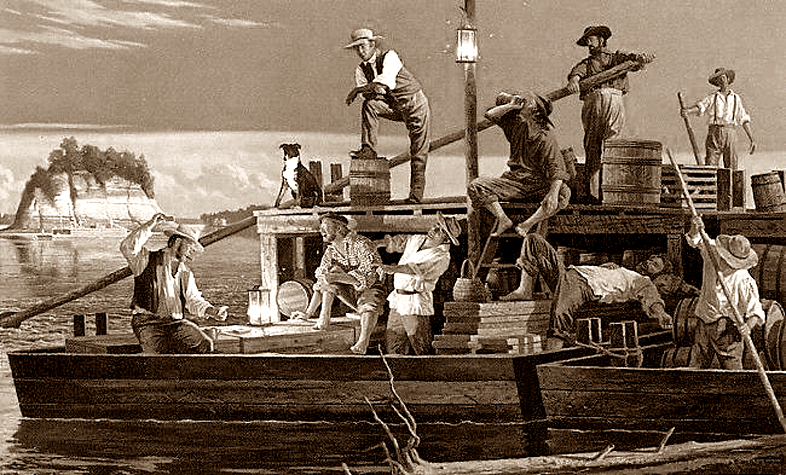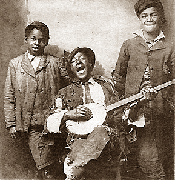|
 To
see America, the river is still the best road, as it was in Twain’s day.
All along the way, little river towns cling without apparent effort to the
charm of a bygone era. Towns along the river tend to ebb and flow rather
like the river, itself. Some boom to life, then falter, decline and die. To
see America, the river is still the best road, as it was in Twain’s day.
All along the way, little river towns cling without apparent effort to the
charm of a bygone era. Towns along the river tend to ebb and flow rather
like the river, itself. Some boom to life, then falter, decline and die.
"The
river's earliest commerce was in great barges–keelboats, broadhorns. They
floated and sailed from the upper rivers to New Orleans, changed cargoes
there, and were tediously warped and poled back by hand. A voyage down and
back sometimes occupied nine months," Twain wrote. "In time this
commerce increased until it gave employment to hordes of rough and hardy
men; rude, uneducated, brave, suffering terrific hardships with sailor-like
stoicism; heavy drinkers, coarse frolickers in moral sties like the
Natchez-under-the-hill of that day, heavy fighters, reckless fellows, every
one, elephantinely jolly, foul-witted, profane; prodigal of their money,
bankrupt at the end of the trip, fond of barbaric finery, prodigious
braggarts; yet, in the main, honest, trustworthy, faithful to promises and
duty, and often picturesquely magnanimous."

"I
remember the dens at Helena and Natchez and all the waterside slums; the
shantyboats with their drifting loafers...the squatters on the banks and the
unbelievable folk of the bayou."
 "I remember the annual processions of mighty rafts
that used to glide by Hannibal when I was a boy,–an acre or so of white,
sweet-smelling boards in each raft, a crew of two dozen men or more, three
or four wigwams scattered about the raft's vast level space for
storm-quarters–and I remember the rude ways and the tremendous talk of
their big crows, the ex-keelboatmen and their admiringly patterning
successors; for we used to swim out a quarter or third of a mile and get on
these rafts and have a ride." "I remember the annual processions of mighty rafts
that used to glide by Hannibal when I was a boy,–an acre or so of white,
sweet-smelling boards in each raft, a crew of two dozen men or more, three
or four wigwams scattered about the raft's vast level space for
storm-quarters–and I remember the rude ways and the tremendous talk of
their big crows, the ex-keelboatmen and their admiringly patterning
successors; for we used to swim out a quarter or third of a mile and get on
these rafts and have a ride."
The
next morning I woke up to dense fog, a total whiteout. The steamboat I was
on glided through it in dead silence like a ghostly apparition, a full 60
feet tall.
Next: Roughing It
|
